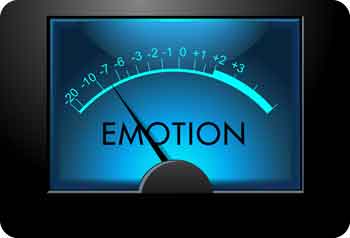90 Emotional Regulation
Based on research by Campbell-Sills, Laura, et al., 2006, written by Juanita N. Baker, Ph.D..
Do people with anxiety or depression respond differently from others when handling negative emotions?
Laura Campbell-Sills and co-psychologists investigated how those with anxiety and mood disorders and those without responded to negative emotions. Both groups watched an emotion-provoking film and completed self-report measures of their experience and regulation of emotions. The film elicited similar increases in negative emotion for both groups. However, clinical participants (those with anxiety or depression) judged their resulting emotions as less acceptable. Females in the clinical group suppressed their emotions more than females in the nonclinical group. For all participants, high levels of suppression were associated with increased negative emotion during the film and the post-film recovery period. Appraising emotions as unacceptable led to both greater negative emotional intensity and greater use of suppression in the clinical group. These findings imply that if we engage in suppression, we may unintentionally increase and prolong negative emotion.
Therefore, to best handle negative emotions, stop trying to suppress, avoid, or change them and instead try to fully accept, even embrace troublesome emotions, thoughts, and bodily sensations. By doing so, those unpleasant feelings will likely pass more quickly.
References:
Campbell-Sills, Laura, Barlow, David H.; Brown, Timothy A.; Hofmann, Stefan G. (2006). Acceptability and suppression of negative emotion in anxiety and mood disorders. Emotion, 6(4), 587-595. doi: 10.1037/1528-3542.6.4.587





